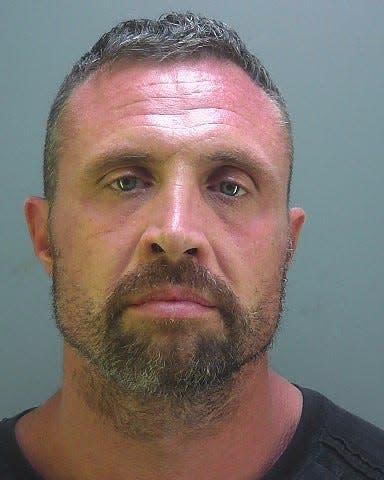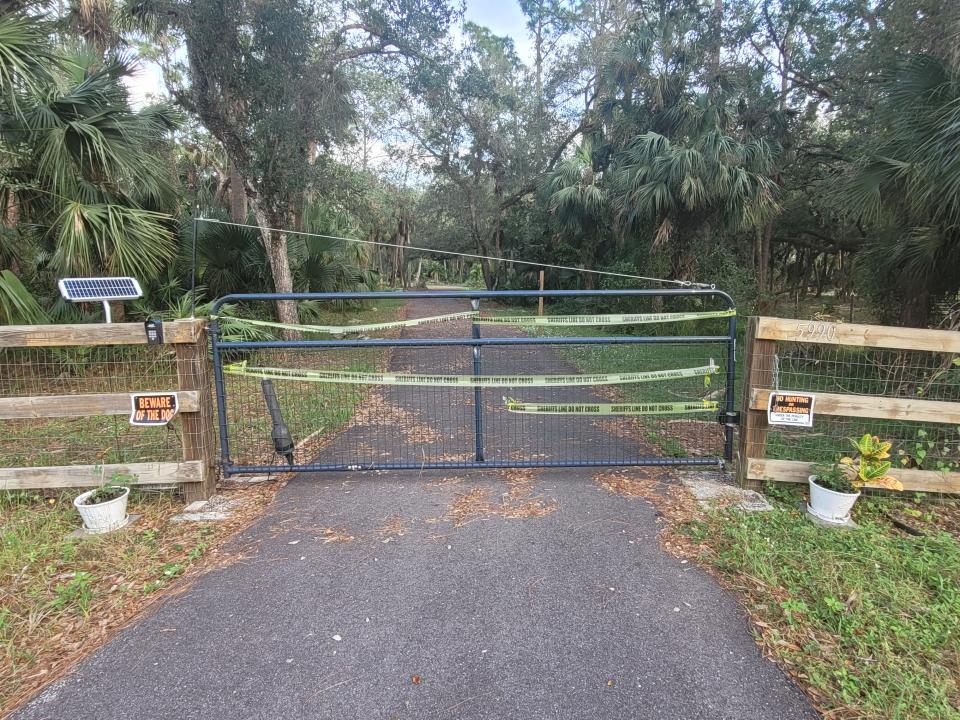Katie Baunach's ex-husband killed her, prosecutors say. The justice system let it happen
Eighteen days before she disappeared, Katie Baunach messaged Sarah Goldsmith, frustrated and desperate.
The two women shared an unenviable bond. They were both ex-wives of 43-year-old Southwest Florida bodybuilder Ian Baunach. They had both narrowly escaped death at his hands after years of physical abuse, according to statements they gave police.
And in both their cases, an array of authorities in Florida and Indiana – police departments, prosecutors, child service agencies and judges – failed to protect them.
"I filed an abuse report online. I’ve called and left a message for the DCF investigator. I have made a police report and had them take pictures. I have filed for a restraining order," Katie wrote in a Facebook message to Goldsmith on Sept. 12. “And it’s like no one is taking this serious but me. I’m sick about it.”
Katie, a 39-year-old registered nurse, was reported missing the morning of Sept. 30 -- two days after Hurricane Ian made landfall in Southwest Florida with 150-mph winds, devastating the region and killing dozens. That afternoon, Hendry County Sheriff's deputies found Katie's remains on Ian’s property in Fort Denaud, Florida. They arrested Ian, who was charged with first-degree murder and is being held without bond.
A three-month USA TODAY Network-Florida investigation into Katie's death found a series of failures to protect her by every layer of state and local law enforcement.
“There were so many instances that Katie tried to get help and there was none to be had,” said Carolyn McKinney, Katie’s mother. “They said it was a he-said she-said. Like when he tried to strangle her to death.”
Among those missed chances:
State Attorney Amira Fox charged Ian with a felony and issued a no-contact order after he allegedly strangled Katie in November 2021. Katie forgave him after he violated that order to tell her he had found God – and prosecutors dropped the charges. The case’s lead prosecutor wrote in case notes that she would have continued without victim testimony in “90 percent” of similar cases.
Fox's office did not file charges against Ian for allegedly kicking Katie in the back and threatening to kill her in March 2022, despite Hendry Sheriff’s deputies writing in their reports that they had sent the case to Fox’s office and were requesting an arrest warrant.
Three of Katie’s police reports against Ian – for the alleged assault in March 2022 and two alleged restraining order violations linked to the strangulation case – were closed in a three-day span, from June 14 through June 16, 2022. The State Attorney’s Office and the Hendry Sheriff’s Office did not respond to questions about why the cases were abandoned.
No charges were filed after Katie told Florida Highway Patrol on June 23, 2022 that Ian shoved her out of his car, left her and their two young children on the side of the highway and stole her purse.
Lee Circuit Judge Amy Hawthorne denied Katie’s request for a permanent restraining order six weeks before her death, expressing incredulity that Katie could be telling the truth about the highway incident.
Similar events occurred in Clark County, Indiana, after Ian was charged with battery and intimidation against Goldsmith in 2013. Goldsmith said Ian promised her money and a car in the divorce settlement if she recanted her allegations – and exhausted by months of conflict, she agreed. Prosecutors never contacted her when she stopped going to court, instead summarily dropping the charges, she said.
And Ian’s first wife, Rachel Calvert, said Clark County prosecutors dropped multiple domestic violence cases against him following their divorce in 2007.
USA TODAY Network-Florida’s investigation is based on police reports and court filings from agencies in Florida and Indiana, prosecutors’ notes, Katie’s Facebook messages and interviews with people intimately familiar with Ian’s alleged violence: her mother, her divorce attorney, and Ian’s two previous wives.
Ian's defense attorney in the murder case, Robert Harris, declined to comment for this story.
Abuse goes unreported
More than 30,000 adults and children seek shelter or refuge to move away from an abusive spouse or partner every day, according to the Domestic Violence Resource Network.
Studies show many survivors do not report domestic violence to law enforcement, and when they do the results are often disappointing. Less than half of domestic assaults were reported to police in 2021, according to a report from the Bureau of Justice Statistics.
Ana Walshe disappearance: Brian Walshe, husband of missing Massachusetts mom, charged with murder
Experts: Pregnant people could face greater risk of domestic violence after abortion bans
Survey:Levels of stress, anxiety and sadness among women are at a 10-year high
Hesitation to call police can stem from fears that doing so could prompt retaliation from an abusive partner or lead to the loss of child custody, said Meg Dalabes, Director of Community Education and Development at ACT, a Fort Myers, Florida-based domestic violence center.
“They have to weigh a variety of risks, and sometimes involving law enforcement can make them feel like it might get worse," Dalabes said in an interview. “We need victims to be able to have many safety options.”
On Dec. 2, Fox stood at a podium, flanked by Hendry Sheriff Steve Whidden, to announce Baunach’s grand jury indictment for first-degree murder, abuse of a dead human body and tampering with evidence. She praised the Sheriff’s Office’s for its quick response to Katie's disappearance.
“[The Sheriff’s Office’s] extremely swift actions and quick work in this case helped find evidence and retain evidence before it was destroyed by the defendant, thus leading to this indictment,” Fox said.
But she would not answer questions about Katie’s earlier police reports, in which her office had not brought charges.
“I’m not going to comment on any prior cases between the two because of this current case and the possibility that some of that might be used in this current case,” Fox said.
Clark County, Indiana Prosecuting Attorney Jeremy Mull said he could not provide information about Ian’s charges there because the cases had been legally expunged. The Florida Department of Children and Families did not answer questions about its cases involving the Baunach family.

Meeting the “monster”
More than anything, McKinney said, her daughter wanted to be loved.
Katie McKinney grew up in New Albany, Indiana, a compact city of 40,000 people separated from Louisville, Kentucky by a four-mile bend in the Ohio River. She was “sunshiney,” easy to like and did what she set her mind to, McKinney said; in high school, she made the dance team without having taken a single lesson.
But when Katie was 15, the family was upended. She and her older sister Kim loved their father, McKinney said. When he ran out on them, with no farewell and no warning, it unmoored them both.
“The kids were upstairs doing their homework. He left, they didn’t know,” McKinney said. “It was like somebody had died, he just disappeared. He didn’t take his things, he didn’t come back.”
To outside observers, Katie persevered. She caught the eye of the University of Louisville’s cheerleading coach and rehearsed with the team during high school, before enrolling at the school as an undergraduate. After an injury ended her dance career early, she graduated in 2010 and began working at a nursing home in Louisville.
But within, she was insecure and hurting, according to McKinney.
“She wanted somebody to prove to her that they loved her,” she said. “She never felt good enough.”
Ian saw that vulnerability and exploited it, McKinney said.
In 2014, when McKinney learned her daughter had met a man on the dating site Christian Mingle, she did what concerned moms do: she looked him up.
His name was Ian Baunach. He was a former Marine and a bodybuilder, with a master’s degree in divinity from Liberty University, who cut an imposing figure. Six foot three, 240 pounds, with the sort of shredded physique that is hard to achieve without pharmaceuticals. (After Katie’s death, Hendry County deputies charged him with felony possession of steroids.)
And his two previous wives had accused him of assaulting them, according to court records in Indiana.

“There was so much, so much domestic abuse,” McKinney said. “I flipped out. I called him and I asked him to come to my house.”
Ian arrived with explanations. His exes were crazy, dishonest, picking on him because of his imposing appearance, he told McKinney. He’d been charged, but not convicted; he was a put-upon victim.
“Katie was not a really trusting person, but she believed him," McKinney said. "Because she believed him, I had to put my doubts out of my head. Because she would not be with someone who was awful.”
Ian’s Indiana court records are no longer publicly accessible because he had them expunged. But USA TODAY Network-Florida spoke with both of Ian’s previous wives, and they provided court documents, medical records and interviews that portray him as a serial and nearly lethal abuser.
Rachel Calvert met Ian at the gym in 2004. She lived in Jeffersonville, Indiana; he was finishing his psychology degree across the river at the University of Louisville. They married the next year, and the abuse started when she was about eight months pregnant, Calvert said.
It continued through the 11 months they were married and for years after their divorce, she said. The alleged assaults inflicted black eyes, fractured ribs and a fractured jaw. And though Calvert repeatedly reported him to the police, leading to multiple arrests, the District Attorney’s Office always dropped the charges, she said. Ian was never convicted.
Prosecutors never spoke to her after her initial police reports and never asked her to testify, she said.
“They never actually prosecuted him as a habitual domestic violence abuser,” she said.
Calvert was the first of three women to describe Ian’s alleged reign of terror as a spouse.
Goldsmith, a native of Jeffersonville, Indiana, married Ian in 2012. He was in his early 30s; she was eight years younger. They both had young children from previous relationships, and at first he seemed “perfect,” she said.
But once they married, his behavior worsened, she said. He allegedly beat her and struck the kids hard enough to leave bruises. She told her family, but could not accept their pleas for her to get out.
“Then they all hated him and they didn’t want me there. At that point I had to choose,” Goldsmith said. “Was I going to leave and be a single mom and figure out my whole life again, or was I going to stay and work it out because he said he was going to change?”
The relationship deteriorated, and on Oct. 4, 2013, Ian filed for divorce. Eight days later, Goldsmith said, he tried to kill her.
She had no money of her own and Ian refused to give her any when they separated, she said, so when he was away for work she took cash from their safe and left in their car. He asked her to come over to talk; when she did, he allegedly brought her into the basement, tied her to a chair and said he planned to kill her and her son. He started beating her, she said, and told her to drive with him to her uncle’s house to pick up the money and her kid.
But when he put her into the passenger’s seat of the car, she acted fast. She locked the doors, retrieved a key from the center console and sped to the nearest police officer. Goldsmith said she suffered bruised ribs, bruised kidneys and a broken nose. Hospital records show she had surgery to repair her nose later that month.
The Clark County Prosecuting Attorney’s Office charged Baunach with battery causing bodily injury and intimidation. But the case dragged on and Goldsmith said that Baunach reached out to her – violating a restraining order – to offer her a more favorable divorce settlement if she did not testify. Exhausted and in need of money, she agreed.
“When a woman has been manipulated and coerced for so long, it’s very hard for them to have to go into court with their abuser,” Goldsmith said. “They have to defend themselves all over again.”
Once again, the charges were dropped.

New victim, same story
Two years later, a similar pattern unfolded with Ian’s next wife.
Ian and Katie moved repeatedly across the country – first to Florida in 2015, then to Massachusetts where they had their son, and then back to Indiana, where they had a daughter.
In 2020, Ian visited McKinney, Katie’s mother, with a proposition: move to Florida, retire and live with him and Katie. McKinney said she thought hard and prayed over it. She had been at her job for 21 years and loved her house, but wanted very much to be near Katie and the grandchildren.
“It was a very kind, wonderful invitation," McKinney said.
She accepted, but it didn’t stick.
The family’s dynamics were off-kilter in ways that made her uncomfortable and nervous, McKinney said. Ian would appear to be fine, go on errands and come back angry, she said. He would get irritable when McKinney left the house without his permission. He invited Katie’s sister to stay with them as well, but threw her out less than a week later.
The family home was in a secluded corner of Fort Denaud, Florida, down a half-mile private road surrounded by farmland and woods. They kept chickens, and one morning one of the birds escaped the coop only to be killed by the family’s dog. At first, McKinney said, Ian seemed calm. But that evening, he called the dog outside, and McKinney heard yelps. Ian was beating the dog with a piece of wood and shoving the dead chicken in its face.
“I started getting really panicked over what we’re dealing with,” McKinney said.

Her relationship with Ian soured and she left. But Katie stayed. And Ian’s alleged abuse worsened.
“As it turns out things were bad all along, but Katie didn’t let anybody know,” McKinney said.
Katie had kept years of mistreatment a secret, her mother said. But on Oct. 13, 2021, Ian allegedly came close to killing her – and Katie broke her silence.
It started with an argument over money. Ian became furious with Katie when she used her credit card to buy gas, according to a Hendry Sheriff’s report. He smashed her iPad and took her phone, she later told deputies; when she tried to take it back, he allegedly shoved her onto a futon and began to choke her.
He eventually loosened his grip, grabbed her by the hair and threw her to the floor, according to the report. She ran to a bedroom and called the Sheriff’s Office, as Ian allegedly fled the house in the family’s pickup truck.
“[Katie] stated she was scared for her life and while being choked she began to lose consciousness,” Deputy Andrew Eldridge wrote in a warrant affidavit for Ian’s arrest.
Eldridge noted that Katie had red marks on her neck and a torn collar on her shirt. When he asked if Ian had abused her before, she nodded but seemed too emotional to speak.
Less than two weeks later, Ian filed for divorce. Katie took the children to her mother’s home and hoped to stay, but the court required her to appear in person, so she returned to the house in Fort Denaud with the kids.
She sat up each night with a gun, terrified that she would see Ian emerge from the long dark driveway to finish what he started, McKinney said.
“When she went back she was scared for her life,” she said.
The State Attorney’s Office charged Ian with domestic battery by strangulation, a felony that carries a penalty of up to five years in prison. And a judge issued a restraining order barring Ian from communicating with Katie.
But the charge didn’t stick. According to McKinney, Katie’s Facebook messages to Goldsmith and Katie’s divorce attorney Sal Bazaz, Ian violated the restraining order, repeatedly contacting Katie and begging her forgiveness. She longed to keep her family together and decided not to testify in the case – a decision she regretted bitterly, she told Goldsmith in July 2022.
“I am guilty of letting him back in several times because I really wanted a family,” Katie wrote. “I had domestic battery by strangulation and an injunction that would keep him away for a year and he got me to drop that claiming he had recommitted his life to Christ.”
Katie told the State Attorney’s Office that she did not want to move forward with the case in January of last year. Lacking her testimony, prosecutors dropped the charges.
But cases like Katie’s do not always require the victim’s cooperation, according to the lead prosecutor’s own case notes.
“I explained that nine times out of 10 this discussion would not result in the dropping of the State’s case,” Assistant State Attorney Kimberly Mitton wrote on Jan. 31, 2022.
The problem, Mitton wrote, was credibility. She cited “witnesses that the vic was not being completely honest,” and claimed that the pictures of Katie’s neck “did not show the injuries she stated were observed.”
“It would be a tough case and not at all provable without her participation,” Mitton wrote. “He does not have any prior criminal history therefore the state is comfortable moving forward with her request to drop charges.”
Dalabes, of the ACT domestic violence shelter, said bringing a case without a victim's approval presents a thorny conflict between the self-determination of survivors and the societal interest in prosecuting severe domestic abuse.
“We fully believe and encourage that victims should get to make the decisions on what they think is safest. That will not always look the way that we think it should look," Dalabes said. “At the same time, we as a society need to step in and say violence is unacceptable.”
The USA TODAY Network-Florida asked the State Attorney’s Office whether prosecutors were aware of Ian’s previous arrests for domestic violence in Indiana and why they did not re-open the case once Katie filed additional police reports against him less than two months later. The agency declined to comment.
More allegations, no charges
Katie’s hopes that Ian had changed were short-lived. On March 17, she called the Hendry Sheriff’s Office, saying that Ian had kicked her in the back and threatened her life in front of their children.
“Katie stated that Ian told her that if she called the police it would be the last thing she ever did,” Deputy Andrew Foreman wrote in his report. “Katie filled out a victim statement and an affidavit wishing to press charges.”

The Sheriff’s Office notified the state Department of Children and Families and forwarded the case to Fox’s agency for review. Two days later Sgt. Mark White filed a supplemental report saying he planned to send the State Attorney’s Office a warrant request for Ian’s arrest.
Court records show that no case was ever brought against Ian for those allegations. Fox also declined to comment on that case at the press conference for Ian's indictment, citing the ongoing murder prosecution.
Ian’s alleged violence extended to their children. On June 23, Ian told Katie he was taking the kids to SeaWorld in Orlando, saying he had an extra ticket and inviting her along, according to Bazaz. She went, and things went south quickly. Ian’s mood soured and he allegedly lashed out at their son, slapping him in the face while the family sat at a restaurant in the theme park, Katie later told Bazaz.
Ian allegedly struck the children frequently, Bazaz said, sometimes leaving marks. At the time, DCF investigators did not find cause to bring a case against Ian, Bazaz said.
“According to Katie, DCF told her spanking is OK in Florida so whatever marks that were left weren’t bad enough that they were going to make a move,” he told USA TODAY Network-Florida.

On the drive home, Ian yelled at Katie, blaming her for him losing his temper, according to the account Katie gave Bazaz. When they were still on the highway in Osceola County, Ian pulled over, and allegedly forced her out of the car. He drove off with her purse and phone, leaving her and the children on the side of the highway, according to a statement Katie gave to Florida Highway Patrol.
A trooper dropped her and the kids off at a domestic violence shelter, the police report said. No charges were ever brought, and Florida Highway Patrol did not respond to questions about whether they referred the case to Osceola’s State Attorney’s Office.
Katie obtained a temporary restraining order against Ian and hired Bazaz in August to handle her increasingly contentious divorce case. And in the middle of that month, Bazaz argued to make the restraining order permanent at a hearing before Judge Hawthorne.
But Ian disputed Katie's account of the incident, testifying that she took the kids from the car and refused to get back in. Hawthorne ruled against Katie, saying there was insufficient evidence to extend the protection order.
“I know probably neither one of your stories is probably 100 percent true. Because it can’t be,” Hawthorne said in a recording of the hearing obtained through a records request.
And she told Katie to forgive her alleged abuser, citing concern for the couple’s children.
“You need to get over your anger at each other or whatever bad feelings you have toward each other, or suppress them, or do therapy or do something, because what you’re doing to your kids is just an abomination,” Hawthorne said.
It was a decision that Bazaz still does not understand. And it turned out to be another missed chance to save Katie’s life, he said.
“How was it possible that the injunction wasn’t granted? It doesn’t make any sense,” Bazaz said. “It doesn’t take a genius to understand that if that order of protection was granted, Katie wouldn’t have been at his house.”
Judges in Florida deny petitions for protection orders because they do not find enough evidence of immediate physical violence, even with documented past abuse, said Dalabes. That rejection "can be really discouraging" for survivors, she said.
The 20th Judicial Circuit declined to answer specific questions about Hawthorne’s reasoning, saying the decision-making process of judges is not public information beyond what is contained in the court record.
“Judges can only make the best decision possible based on the law and the limited amount of information that may be before them at that particular moment in time,” 20th Judicial Circuit spokesperson Sara Miles wrote in a statement. “Without a doubt, the death of Katie Baunach is a true tragedy and a terrible loss for her family and friends.”
A friend in the darkness
As the justice system failed her, Katie found solace in friendship with a woman who’d been exactly where she was.
On July 19, Goldsmith sent Katie a Facebook message for the first time. Ian had reached out to Goldsmith by email, saying he was divorced again and planning to move out of the country. Goldsmith already knew about his arrest for strangulation and she said she decided to reach out to Katie to give her support.
“I just wanted to tell you that you are beautiful and strong,” Goldsmith wrote to Katie. “You are going to be more without him than you ever could’ve been with him.”
Katie responded with gratitude, and an apology for not believing Goldsmith’s allegations of abuse while she was still with Ian.
“I didn’t know what a monster he truly was,” Katie wrote. “I’m sure you know that even though we are no longer together my battle is just beginning.”
For that fight, Katie needed an ally, and she had found one. She told Goldsmith her fears, hopes and frustrations – about how Ian had allegedly isolated her from her family, pressured her to drop out of nursing school and beaten their children.
“He is going to kill someone one day!” Katie wrote two-and-a-half months before she died. “If it hadn’t been for what I can only call divine intervention I thought it was gonna be me!”
After Hawthorne refused to extend Katie’s protective order, she told Goldsmith that Hawthorne had ordered equal custody of the children after falling for Ian’s “elaborate bullshit story.”
“I had to let my babies go back to him where they get hurt. They were so upset,” Katie wrote. “I feel really defeated. I’m so sad and I’m worried about my babies.”
And through it all, she leaned on Goldsmith for support.
“We will always be linked by this horrible man and what he’s done to us but how great would it be if we turned the tables and both gained a friend out of it,” Katie wrote.
The summer passed as Katie and Ian's divorce moved through Hendry County family court. Katie rented a townhouse in Fort Myers for herself and the children. But in September, matters reached a breaking point.
On Sept. 11, Katie picked up the children from a weekend at their father's. They were not OK, McKinney said. Katie's son had a large purple bruise covering part of his buttocks – the result, he told his mother, of Ian beating him in a rage.
Katie once again called the Hendry Sheriff’s Office. A responding deputy confirmed that the bruise existed and contacted DCF, who said they would follow up. But when the deputy interviewed Ian four days later, he denied any knowledge of the bruise.
“Ian stated that mom tells lies,” the deputy wrote in her report.
Once again, no charges were filed.
Katie had Bazaz, her attorney, submit an emergency motion to strip Ian of shared custody. DCF scheduled an interview with the boy for early October, and a family court judge granted Katie exclusive custody.
But Katie's time was running short. On the day he lost custody of the kids, Ian searched the internet for ways to dispose of a body, according to charging documents in his murder case. And on Sept. 29, the day after Hurricane Ian left Southwest Florida in a state of disaster, he asked Katie to come to the Fort Denaud house. He said it was her last chance to pick up her remaining possessions before he left the country the next day, according to a sheriff’s report.
Katie dropped the children off at a friend’s house and drove to Ian’s around 9 p.m. that night, the friend later told investigators.

The next day, Sheriff Whidden got a knock at his door. It was one of his neighbors, the friend of Katie’s who was watching her kids while she went to Ian’s house. Katie had not returned, she told Whidden.
“That led me to believe that something bad had happened, knowing the history between the Baunachs and their divorce,” Whidden said at a press conference following Ian’s indictment.
Hendry Sheriff’s deputies drove to Ian’s home and found Katie’s car parked in his driveway. They suspected Katie was being held against her will, investigator Sergio Bustamente wrote in his report, and obtained a search warrant to look for her inside the house.
They found a bloodstained bathroom rug, empty bottles of bleach and chlorine and a freshly cleaned chainsaw, Bustamente wrote – but no sign of Katie. Fearing the worst, deputies obtained a second warrant to search for evidence of a homicide.
They used luminol, a chemical that glows on contact with blood, to search for signs of a struggle. The luminol revealed large spatters of fluorescent blue, Bustamente wrote – in Ian’s car, on three different walls, on the door frame of an office which contained a broken mirror. Katie was wearing her engagement and wedding rings when she left for Ian’s, the friend who saw her last told police; investigators found both in the office safe.
And when they searched the backyard, they found a still-smoking burn site containing human bones. On Oct. 5, DNA testing confirmed they were Katie’s remains. Authorities arrested Ian and charged him with Katie's murder.
Goldsmith’s last message to Katie, sent after she went missing, would remain forever unanswered.
“Hey lady!! Did you make it through Hurricane Ian?! The actual hurricane that is?! Lol,” Goldsmith wrote. “Is your house still standing and kids ok?”
This article originally appeared on USA TODAY: Ian Baunach: Florida bodybuilder accused in ex-wife Katie's death

